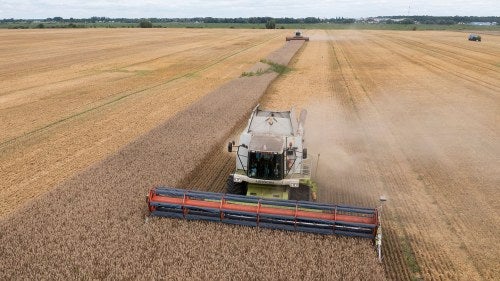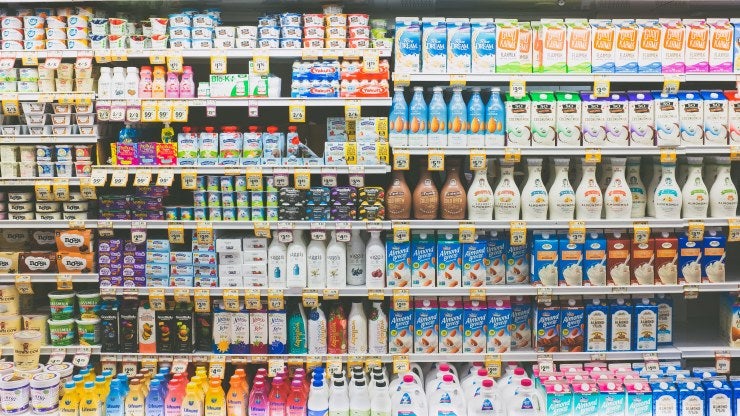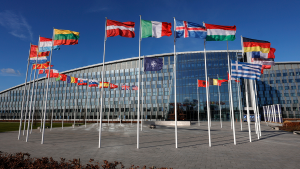Got Milk, Wonder Water, and a New Outbreak
Check out our roundup of the week's top news and research in food, agriculture, and global development.

Top Story
Climate Change Threatens Breadbasket Regions
According to researchers, there is now a 66 percent chance we will pass the 1.5 degrees Celsius threshold by 2027, a result of human-made emissions and a likely El Niño weather pattern this year. Brazilian sugar producers, American grain farmers, and international traders are bracing for climate warming and the upcoming weather phenomenon, which could upend output from the world’s breadbasket regions.
Council Insights
A New Food Label
“The impetus behind a sustainable food seal is clear: the system is ripe for a food information revolution,” write global food and agriculture thought leaders in a new white paper. “A sustainable food seal offers an opportunity to unify the entire food system from farmers to food companies to consumers, and arms them with clear information in order to make decisions and take appropriate steps to protect our food and our planet.” Read the white paper to learn more.

Food & Agriculture
A New Outbreak
Brazil, the world's largest chicken exporter, faces its first-ever avian influenza outbreak in two wild birds, raising concerns about the impact on the country's poultry industry and global trade. In response, Brazil has intensified its defense measures, implementing strict quarantine protocols and increasing surveillance to safeguard its position as the top chicken producer worldwide.
Musseling Waters
Researchers at Khalifa University in Abu Dhabi have developed a nanomaterial inspired by mussels' adhesive proteins that can effectively remove dyes and pollutants from industrial wastewater. The material shows promise in cleaning textile industry wastewater, which accounts for up to 20 percent of industrial wastewater globally.
Grain Deal Extended
In response to ongoing negotiations, the Black Sea grain deal between Russia and Ukraine has been extended for an additional 60 days. With the extension, the US Department of Agriculture has introduced the Black Sea Grain Food Security Dashboard to monitor and assess regional grain supplies and promote food security.
Deeper Dive
Should We Be Worried About Avian Influenza?
Avian influenza, also called bird flu, has spread from birds to other animal species, increasing concerns about its threat to humans. Although human infections with avian influenza have occurred, they are sporadic and infrequent, making the risk of avian influenza low for the general population.
Resilience
Wonder Water
FAO and UNICEF have partnered to enhance water security in Somalia. Their collaboration aims to improve access to safe water and sanitation facilities, strengthen water management, and monitor droughts. According to UNICEF, only 52 percent of Somalis had access to a basic water source in 2019, a situation that has barely changed over the past four years.
DC Report
Got Milk?
USDA is considering a ban on flavored milk from school lunches as part of their efforts to reduce sugar consumption among students, a move that has sparked debate about the nutritional value of the beverage in elementary and middle schools. The ban would include chocolate and strawberry milk.
Big Actors
Ethanol Future?
Honeywell and Summit Agricultural Group are joining forces to construct the largest-ever plant for producing ethanol-based jet fuel—fuel made from corn and other plant materials—as the aviation industry seeks sustainable fuel alternatives. The new effort aims to contribute 250 million gallons of sustainable aviation fuel annually.
Big Ideas
Celtic Rainforest
The UK government plans to revive the Celtic rainforest in Snowdonia National Park by planting 30,000 saplings annually as part of a reforestation effort to restore the ancient woodland. This initiative aims to protect biodiversity and restore Britain’s Celtic rainforests, which are woodlands defined by high humidity and stable temperatures.
Ask an Expert
What role do you think technology will play in the future of agriculture?
“With all of the technological capabilities that we have right now, I can only imagine what will be available in 25 years…I don't think we were even talking about artificial intelligence or robotics 20 years ago. But now, it's very much something that people are using and considering. So, it's really exciting to me to think about the future for related to being able to solve that challenge of how we get to a place where people are no longer hungry, but also at the same time being able to sustain our natural resources in a way that conserves it for future generations to come.”
— Peggy Tsai Yih, Managing Director of the Center on Global Food and Agriculture, in episode three of our limited podcast series.


Have a question about food and agriculture? Ask one of our experts at the Center on Global Food and Agriculture to get an answer in next week's Global Food for Thought!
Council Events
Did you miss one of our previous livestreams? Don't worry! They are all available on our website to watch at any time.
Other Upcoming Events
China’s Discussion of IFPRI’s 2023 Global Food Policy Report: Rethinking Food Crisis Responses
Date: May 21
Time: 9:00 – 11:30 a.m. GMT+8
USDA Rural Mental Health Matters: Challenges, Opportunities, and Resources for Communities
Date: May 23
Time: 1:00 – 2:00 p.m. CT
Climate Generation: Talk Climate Gathering
Date: May 23 - 25
GCM Talks: Remittances, Diaspora, and the Sustainable Development Goals
Date: May 25
Time: 3:00 – 4:30 p.m. CET
Africa Agribusiness and Science Week
Date: June 5 - 8
Land Acknowledgement Statement
The Center on Global Food and Agriculture recognizes it occupies the ancestral land of the Kiikaapoi, Peoria, Kaskaskia, Bodwéwadmi, and Myaamia people. Indigenous communities around the world disproportionately experience the pressures of climate change, global conflicts, and the COVID-19 pandemic, while simultaneously stewarding 80 percent of the world’s biodiversity. These Indigenous tribes and nations are the original owners of this land and continue to be systemically erased by policies and practices that ignore their histories. To learn more about Indigenous foodways and practices, check out our 2022 blog series "Stewardship, Sovereignty, and Solutions."
Related Content
- Embracing Dandelions as Food and Medicine
- Going Beyond Regenerative Agriculture on Tribal Lands
- Expanding "638" to Enhance Native American Food Sovereignty
- Flavors and Culture: Food Systems Through Indigenous Women's Eyes
- A Thanksgiving Legacy: Fighting for Indigenous Food Sovereignty
- Native Food Sovereignty: Strengthening Connection to Culture
- Reconnecting to Indigenous Food Sovereignty Values and Practices
- Embracing Interconnectedness: How Indigenous Foodways Can Save Us




